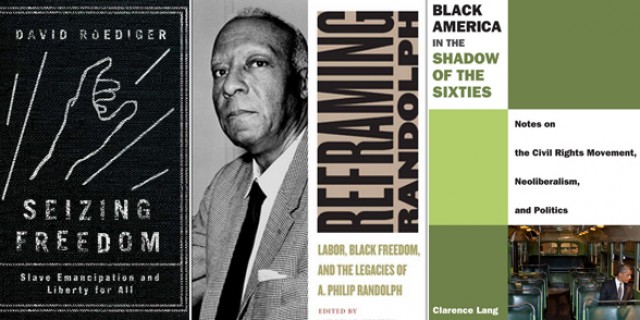To mark Black History Month, we have compiled a list of books, research videos and projects from across the College of Liberal Arts & Sciences at KU that recognize the central role of African-Americans in U.S. history and celebrate the achievements of black Americans. The list is organized chronologically.
Have a project or publication that we missed? Please send it our way.
Slavery & Emancipation
When President Lincoln signed the Emancipation Proclamation on Jan. 1, 1863, the leader of the Union Army legally outlawed slavery across the United States. Lincoln’s role in this significant moment in U.S. history is well known, depicted, for example, in Steven Spielberg’s 2012 box office hit “Lincoln.” But the contributions of the large number of slaves in bringing about their own emancipation is told far less regularly. In “Seizing Freedom: Slave Emancipation and Liberty for All,” KU Foundation Distinguished Professor David Roediger (history, American studies) delves into the archives to uncover art and written texts that help tell this important American story from the slaves’ point of view. In doing so, Roediger not only shows that the “slaves emancipated themselves in large measure,” but also argues that this moment rattled the foundation of America’s ideas about freedom, paving the way for other emancipatory movements.
Civil Rights
Civil rights leader, peace activist, journalist, historian and artist, W.E.B. Du Bois is one of the most important intellectuals in American history. The issues Du Bois thought and wrote about still resonate today. From debating the Confederate flag to nuclear weapons, get a glimpse into Du Bois’ main ideas as they evolved over the course of his life in “W.E.B. Du Bois: An American Intellectual and Activist.” Author Shawn Alexander is associate professor of African and African-American studies and director of the Langston Hughes Center at KU.
Dave Tell, associate professor of communication studies at KU, helped develop a website and smartphone app to tell the story of the death, trial and public memory of Emmett Till in and around the Mississippi Delta. “The diversity in the stories is what makes the Emmett Till story so powerful,” Tell said. “If there was only one version of the story that everyone knew was true, it would have never had the staying power that it has.” More here.
The civil rights struggle of the 1960s is a key moment in American history. While some figures have received much attention, the legacy of other leading individuals has been lost; figures like A. Philip Randolph, for example, who was one of the most influential African-American civil rights and labor leaders from the 1920s to the 1960s. The complicated history of Randolph’s involvement in both class and race struggles is the focus of “Reframing Randolph: Labor, Black Freedom, and the Legacies of A. Philip Randolph,” jointly edited by Clarence Lang, professor of African and African-American studies at KU.
During the spring of 2017, the Project on the History of Black Writing at KU has been shining a spotlight on the writers, artists and musicians of the Mississippi Renaissance. The series, called the 2017 Black Literary Suite, leads a series of events on writers and poets, such as the novelist John Hatch and poet C. Liegh McInnis, who have commonly been overlooked on a national scale with more focus on their contemporaries in Harlem. Learn more about the 2017 Black Literary Suite and The Project on the History of Black Writing.
At the local level, KU undergraduate student Jesse Burbank examines a 1950s-era civil rights battle in Kansas City, Missouri, focused on the desegregation of Swope Park Pool.
Even closer to our home in Lawrence, KU history graduate Paul Fowler III, explored the history of racism, activism, segregation and integration in the predominantly African-American neighborhood around 9th and New York streets right here in Lawrence, Kansas.
Modern Day
Tony Bolden, associate professor of African and African-American studies at KU, has been exploring the growth of the Black Lives Matter movement. While police shootings of African-Americans are one explanation for this social movement, Bolden says systematic inequality stemming from race and class is just as important. And these are issues that are shared by a diverse range of social groups across America, making Black Lives Matter an inclusive social movement.
Many modern day protests continue to look back to the civil rights era for rhetoric, strategy and inspiration. But the present context is markedly different from the 1960s. In “Black America in the Shadow of the Sixties: Notes on the Civil Rights Movement, Neoliberalism, and Politics,” Clarence Lang argues that activists seeking social justice need to reflect on present-day social, economic and political challenges in order to understand and address current issues.






